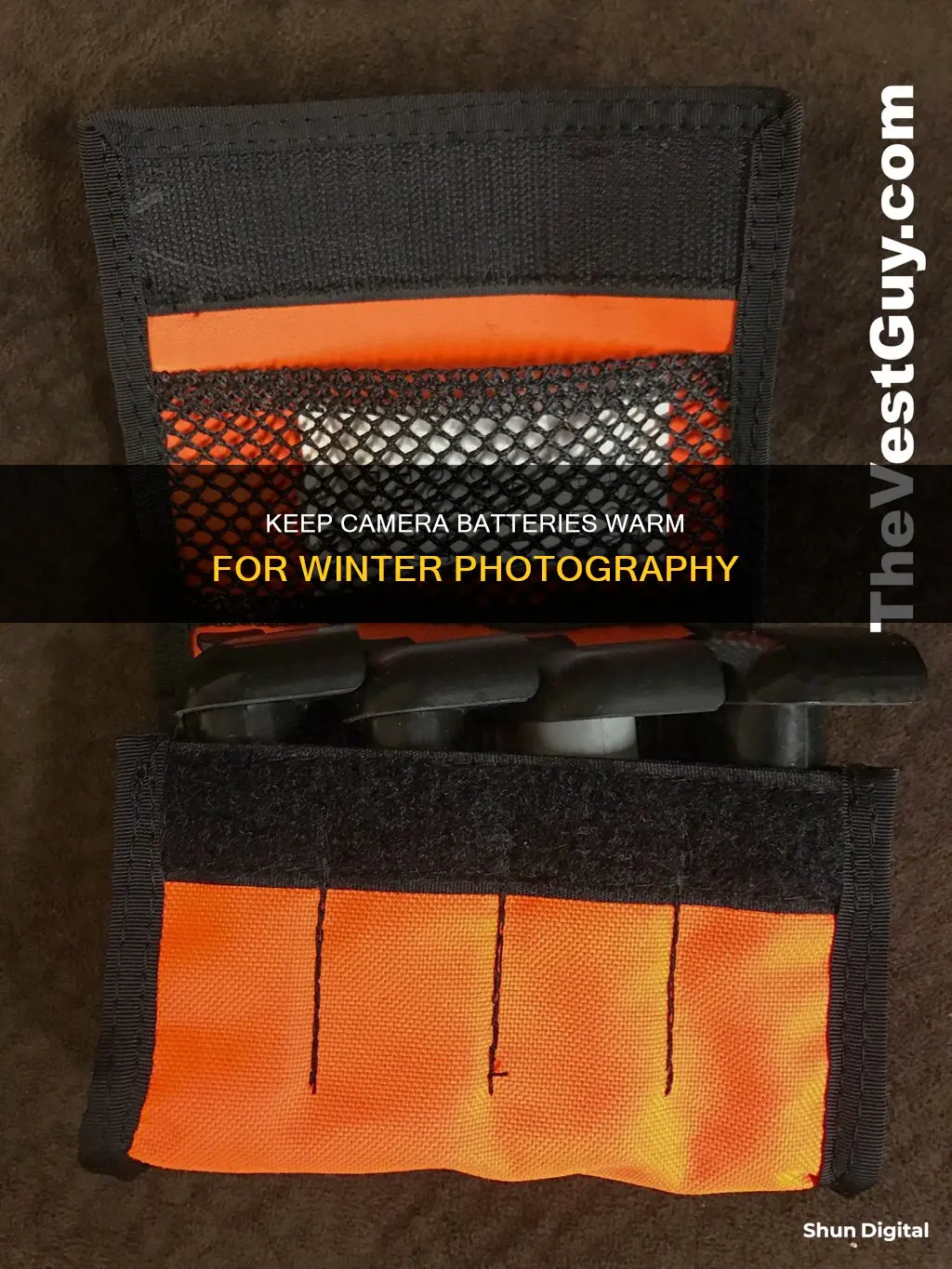
Taking photos in cold weather can be challenging, especially when it comes to keeping your camera battery warm. A drop in temperature can cause a significant decrease in battery life, so it's important to take steps to keep your battery warm and functioning optimally. Here are some tips to help you keep your camera battery warm in cold weather:
| Characteristics | Values |
|---|---|
| Understand how cold weather affects your battery life | In cold weather, the battery life deteriorates much faster than in temperate weather. A drop of 10 °C (18 °F) can cause your battery life to deplete by as much as half. |
| Bring extra batteries | It is recommended to bring at least two or three extra batteries. |
| Use hand warmers | Keep spare batteries with activated chemical hand warmers in your pocket while shooting. If you only have one battery, you can strap a hand warmer to your camera. |
| Keep batteries close to your body | Keep your camera batteries in an inner pocket, preferably close to your core, to keep them warm. |
| Do not warm up batteries too quickly | Do not place batteries too close to a heat source, such as a fire or heater, as it can damage the battery permanently. |
| Recharge at night | Recharge batteries inside a sleeping bag to keep them warm. |
| Avoid frost and moisture build-up | Keep the camera in its case when not in use to avoid frost build-up. Use lens cleaning tissues to dab off any moisture or frost on the lens. |
| Turn off unnecessary camera features | Turn off features like the LCD screen, flash, image stabilisation, and auto-focus to prolong battery life. |
What You'll Learn

Understand how cold weather affects battery life
Cold weather can significantly impact the performance of your camera's batteries, so it's important to take steps to mitigate the effects. Here's what you need to know about how cold weather affects battery life and what you can do to keep your camera batteries warm:
Firstly, it's important to understand that batteries, especially rechargeable lithium-ion batteries commonly used in cameras, experience a noticeable decrease in capacity when used in freezing temperatures. This means that your battery life will deteriorate much faster in cold weather, and you may find yourself with a dead battery in the middle of a shoot. The chemical reactions that generate the electric current in batteries slow down at lower temperatures, resulting in a lower current output. As a result, cold batteries quickly drain and struggle to keep up with the demand for power.
Additionally, the effect of cold temperatures on battery life can vary depending on the specific camera model, battery type, and the actual temperature. In some cases, a battery may completely stop working if it gets too cold. Therefore, it's crucial to take proactive measures to keep your camera batteries warm and ensure they don't drain too quickly.
To counter the effects of cold weather on your camera batteries, consider bringing extra batteries and storing them in a warm place, such as an inside pocket close to your body. Keeping spare batteries warm will ensure you have a fully charged battery ready to go when one runs out. You can also use a portable charger or power bank to extend the life of your camera battery.
It's also important to note that you should avoid warming up your batteries too quickly. Allow them to warm up slowly at body temperature or in a warm room. Exposing them to direct heat sources like a fire or heater can permanently damage the battery.
By understanding how cold weather affects battery life and taking the necessary precautions, you can ensure your camera batteries remain operational during your cold-weather shoots.
Dx Mark 11 Camera: Battery Included or Not?
You may want to see also

Use hand warmers
Keeping Camera Batteries Warm with Hand Warmers
Keeping camera batteries warm in cold weather is essential to ensure your camera keeps running. Batteries, especially rechargeable lithium-ion batteries, show a remarkable decrease in capacity when used in freezing temperatures. One way to mitigate this is by using hand warmers.
Types of Hand Warmers
There are two main types of hand warmers: chemical and mechanical. Chemical hand warmers are air-activated, producing heat through a chemical reaction. They are small, lightweight, and inexpensive. Mechanical hand warmers, on the other hand, are rechargeable and use electricity to generate heat. They are more expensive but can be reused multiple times.
Using Hand Warmers with Batteries
When using hand warmers with your camera batteries, it is important to follow some best practices. Firstly, do not place hand warmers directly on your camera, as this could damage the device. Instead, keep the hand warmers in your pocket or bag along with your spare batteries. This will help maintain the warmth of the batteries and slow down their drain. If you only have one battery, you can tape a hand warmer to the side of your camera to provide extra warmth.
Additionally, be mindful of the temperature of the hand warmers. While chemical hand warmers do not get extremely hot, mechanical hand warmers can reach higher temperatures. Ensure that the hand warmers do not get too warm, as this could potentially damage your batteries. It is also important to note that some photographers avoid using chemical hand warmers due to the fear of damaging their batteries.
Storage Tips
To maximise the warmth of your batteries, consider using a fanny pack or an inner pocket of your jacket to store both your batteries and hand warmers. This allows your body heat to contribute to keeping the batteries warm. If you are using a bag or pouch, ensure that it is well-insulated to retain the heat. You can also place the hand warmers in a ziplock bag and squeeze out the air before sealing. This will help preserve the warmth for longer periods.
Dispose of Your Camera's Lithium Battery the Right Way
You may want to see also

Keep batteries close to your body
Keeping your camera batteries close to your body is a great way to keep them warm in cold weather. The inside pocket of your coat is the perfect place to store them. This will help to maximise their life and keep your camera running for longer.
Photographer Joe Klementovich, based in New Hampshire, uses a small fanny pack worn under his outer layers to store his batteries. He keeps the fanny pack close to his body, underneath his down jacket or fleece. This ensures the batteries remain warm and is also a consistent place to find them, no matter how many layers he is wearing.
If you don't have a fanny pack, be sure to use an inside pocket of your clothing, rather than an exterior one. This will help to keep the batteries warm and is also an easily accessible place to reach them when outside in cold conditions.
Keeping your batteries close to your body is a simple yet effective way to maintain their warmth and ensure they don't deplete too quickly. It is a good idea to carry at least two or three battery packs so that you can switch them between your camera and your pocket to prolong their functionality.
Charging the Kami Doorbell Camera: A Step-by-Step Guide
You may want to see also

Don't warm batteries up too quickly
When it comes to keeping camera batteries warm in cold weather, it's important to exercise caution and avoid warming them up too quickly. Here are some detailed tips to ensure you don't damage your batteries while trying to keep them warm:
Do not use direct heat sources: Avoid placing your batteries too close to direct heat sources like a fire or heater. This can cause permanent damage to your batteries. Instead, opt for indirect methods of warming them up.
Warm them up gradually: If your batteries are freezing cold, it's crucial to warm them up slowly. Allow them to warm up gradually by keeping them close to your body or placing them in a warm room. This slow approach ensures that you don't shock the batteries with sudden temperature changes.
Avoid extreme temperature changes: While you want to keep your batteries warm, avoid taking them from extremely cold conditions to very hot environments too quickly. This can strain the internal components of the batteries and lead to moisture build-up, causing further issues.
Be cautious with hand warmers: Some photographers use hand warmers to keep their batteries warm, but this method requires caution. Avoid direct contact between hand warmers and batteries, and always follow the manufacturer's instructions to prevent damage.
Plan ahead: If you know you'll be shooting in cold weather, plan accordingly. Bring extra batteries, and consider recharging them overnight in a warm environment, such as inside a sleeping bag or near a heater. This way, you'll have a fresh set of warm batteries ready for use the next day.
By following these guidelines, you can effectively keep your camera batteries warm in cold weather without risking damage due to rapid warming. Remember, it's important to warm them up gradually and avoid extreme temperature changes to ensure the longevity and optimal performance of your batteries.
Charging Your Spy Pen Camera: How Long Does It Take?
You may want to see also

Bring more batteries than usual
It's no secret that batteries are susceptible to changes in temperature. A drop in temperature can cause a significant drop in battery life, so it's always good to be prepared. Bringing extra batteries is a simple yet effective way to ensure your camera keeps running in cold weather.
Photographer Joe Klementovich, based in New Hampshire, recommends bringing more batteries than usual because, eventually, "they drain faster no matter how warm you store them". This is especially true for rechargeable Lithium-Ion batteries, which show a remarkable decrease in capacity when used in freezing temperatures.
So, how many extra batteries should you bring? It's a good idea to take at least two or three spare battery packs. That way, you can swap them between your camera and a warm pocket to prolong their functionality. Keep the spares in an inside pocket, close to your body, to benefit from your body heat. An inside jacket pocket or a fanny pack under your outer layers are ideal locations.
If you're worried about the environmental impact of disposable batteries, consider investing in a portable charger or power bank. That way, you can recharge your batteries on the go, reducing the need for disposables.
The Power of Charge-Coupled Cameras: Capturing Light, Creating Images
You may want to see also
Frequently asked questions
Keep your spare batteries in an inner pocket, close to your body, until you need to use them.
Take at least one spare battery pack, and turn off all unnecessary features on your camera to prolong battery life.
Use hand warmers. Put these in your pocket with your spare batteries, or strap one to your camera if you only have one battery.
Avoid frost and moisture build-up. Keep your camera in its case when not in use, and avoid changing lenses in the rain or snow.







